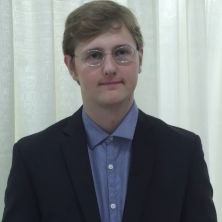What Great Minds Can Do: Michael Novak

Could you describe your Honors Research project?
I researched outlaws in 14th century England, during the reigns of Edward II and Edward
III. I've found that Robin Hood tends to be tame in comparison to others during this
time – by the accounts, they were very violent individuals. During this period, there
were a lot of complaints about outlaws, even noblemen acting outside the bounds of
the law. There was a lot of evidence of rampant crime being committed by them. I was
interested in finding out why these noblemen would commit violent crime, and what
kinds of activities they were engaged in. I also wanted to examine why the crown was
so incredibly ineffective at stopping these outlaws. Some of my research showed that
the crown was unable to work with corrupt local law enforcement; other information
showed that being noble involved a certain degree of criminality.
What motivated you to choose this topic for your project?
In my childhood, I was fascinated by the story of Robin Hood. This is an opportunity
for me to study the real Robin Hood, or the real-life figures who inspired the character
of Robin Hood. It's also a fascinating subject to research – there are accounts of
outlaws committing extortion, robbery, arson and other things you wouldn't normally
associate with the behavior of wealthy members of society.
Could you describe your research process?
It was harder to find primary sources than it is to find secondary sources that discuss
the topic of these outlaws. There's been a good amount of research on these outlaws
in the second half of the 20th century, so I had plenty of information to start this
project. Finding sources for medieval history is difficult, because they take forever
to be published. A lot of the sources aren't digitized, or they are in other languages
and aren't available in translation. I did find some primary information in chronicles,
which were narratives popular during this period. Medieval primary sources can take
a long time to sift through; often, they end up being one quarter truth and three
quarters rubbish. Dr. Wangerin was helpful because she provided me with a digitized
copy of all of the Parliament rolls from this period. Considering Parliament was sometimes
used to try legal cases, I researched if the names of known outlaws show up in Parliamentary
complaints.
What's been your favorite history course so far?
I haven't had a history course so far that I didn’t enjoy. I enjoy American history,
European history, Asian history – I’ll pretty much try anything.
Career Highlights:
- University Honors Program
- Phi Alpha Theta History Honor Society
- Member, Slavic Club
- Member, ALLIES Club
- Student Employee, Seton Hall Sports Poll
- Student Workforce Trainee, Federal Bureau of Investigations, Newark, New Jersey
- Intern, Office of Congressman Donald M. Payne Jr., Newark, New Jersey

